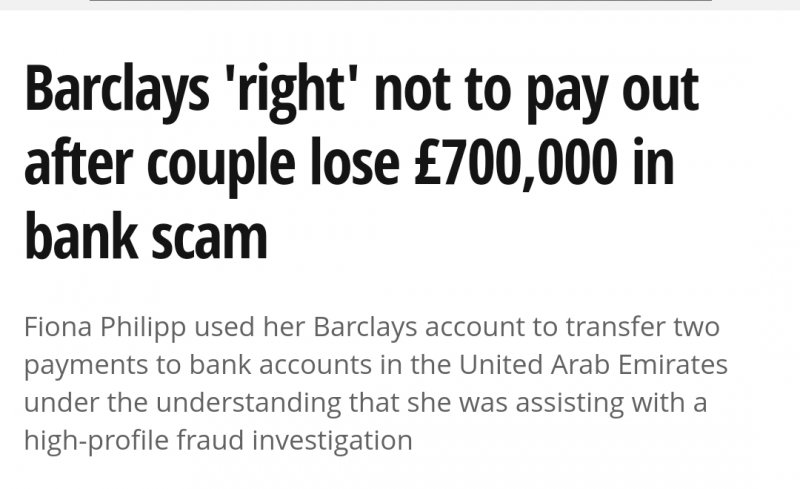You are using an out of date browser. It may not display this or other websites correctly.
You should upgrade or use an alternative browser.
You should upgrade or use an alternative browser.
What makes you grin
- Thread starter Wack61
- Start date
Scaf
Member
- Messages
- 6,582
Last year I was confronted by a serious puddle / flood down a country lane in the dark - I had a choice, risk 18” of water in a 2 year old Jaguar XJ or go the long way round, I took the latter option and added an hour to me journey. I think 6” might make me turn the Strad round.
Wack61
Member
- Messages
- 8,793
Unbelievable , how do people so stupid accumulate so much money , it's not making me grin but really , I'm from the FSA , your account isn't secure , send it to me in the UAE
OK what's the account number, a doctor and a teacher FFS


 www.mirror.co.uk
www.mirror.co.uk
OK what's the account number, a doctor and a teacher FFS


Barclays 'right' not to pay out after couple lose £700,000 in bank scam
Fiona Philipp used her Barclays account to transfer two payments to bank accounts in the United Arab Emirates under the understanding that she was assisting with a high-profile fraud investigation
Wack61
Member
- Messages
- 8,793
When I bought the motorhome I had to insist barclays sent the money , even then they approved the transfer reluctantly , I had to confirm I knew if it was fraudulent I wouldn't be getting it back .
There's no way barclays let them send 400k without some safety checks
There's no way barclays let them send 400k without some safety checks
gb-gta
Member
- Messages
- 1,139
There’s a reason it’s a 30k dealer contribution.
Its the same reason the picture of the car is taken from the back...
Wack61
Member
- Messages
- 8,793
It gets worseBloody ****
C
A recent decision found that the Quincecare duty does not extend to authorised push payments. It neither imposes an obligation on the paying bank to question the customer’s own instruction nor the genuineness of the intended recipient (Fiona Lorraine Philipp v Barclays Bank UK PLC [2021] EWHC 10 (Comm)).
While APP fraud is an escalating issue, until now there has been few reported judgments to give banks a clear position. Read on for more on the detail of the case and what implications this has for you.
The facts
Mrs Philipp and her husband, Doctor Philipp, were victims of a sophisticated fraud. In February 2018 they were approached by a fraudster who persuaded them that he worked for the FCA in conjunction with the National Crime Agency. He advised them of a fraud being carried out at Dr Philipp’s bank and the firm in which he had invested his savings. They were encouraged to transfer Dr Philipp’s savings into “safe accounts” for which the fraudster would provide details. They were also warned to tell no one or it may prejudice the underlying investigation.
In March 2018, Dr Philipp transferred £950,000 to Mrs Philipp’s account at Barclays. On the same day, they received a visit from a police officer who advised that they may have been the victims of fraud. Acting on the instructions of the fraudster, they told the officer they did not wish to deal with her. Subsequently Mrs Philipp attended three separate branches of Barclays on separate occasions with her husband. She gave two separate instructions for two large international transfers to UAE accounts for which details were provided to her by the fraudster. It is said that during the visits, the fraudster listened in on Dr Philipp’s mobile phone. In answer to questions, the Philipps said they had previously dealt with one UAE recipient. On each occasion Mrs Philipp confirmed more than once that she wished to proceed with the transactions.
The scale of the fraud only became apparent some weeks later. After forceful intervention from their friends, Dr and Mrs Philipp eventually engaged with the Police and thereafter complained to Barclays seeking to recover the lost funds.
Mrs Philipps brought proceedings against Barclays alleging that the bank had breached its duty of care to her. Relying on the so-called Quincecare duty, she said the Bank was on inquiry as to the potential fraud, it should have asked her additional questions, blocked her account and prevented her loss. It had failed to comply with its duty of care to protect her from the consequences of making the transfers. Had it done so, she would not have made them. She also sought to rely on the doctrine of undue influence.
The Bank applied to strike out the claim.
Summary of decision
HHJ Russen QC struck out the claim. In finding that the Quincecare duty did not apply, he found Mrs Philipp’s claim was an impermissible attempt to elevate the duty of care from a duty on the Bank to refrain from executing an order if and for as long as the banker is 'put on inquiry' in the sense that he has reasonable grounds (although not necessarily proof) for believing that the order is an attempt to misappropriate the funds of the customer, to a duty to protect the customer from the consequences of her own decisions where the payment instruction was authorised and valid (notwithstanding the underlying fraud).
The key points from the judgment are as follows:
The Bank owed a contractual duty of care to its customers to act in accordance with their mandates and to exercise reasonable care and skill in executing their instructions. That duty is subordinate to the bank’s contractual duties and a bank receiving instructions must balance both. Where a bank receives a payment instruction, its primary duty is to make that payment.
The circumstances in which the bank can deviate from that instruction are limited. The Quincecare duty forms an integral part of the Bank’s duty to act on instructions. It does not impose a duty to decide not to follow instructions.
The consequence of Mrs Philipp’s submissions was that the Bank would come under a much wider legal duty to ensure that the outcome of each of Mrs Philipp’s visits to the branch was different and either the Bank would not act on her instruction, or if it made the transfers, it would need to later reflect and recoup the funds.
The key conflict is this: the law should not impose too burdensome a duty on banks which will hamper effective banking transactions versus the proposition that the law should guard against the facilitation of fraud and the protection of bank customers and innocent third parties.
A banker must refrain from executing an order if, and for so long, as he is put on inquiry in the sense that it has reasonable grounds for believing that the order is an attempt to misappropriate funds. The question is when is a bank put on inquiry, bearing in mind that it is not required to act as an amateur detective. In other words, the question is not about the standard of care required by the Quincecare duty, but rather whether it applies at all when the customer was telling her bank how her money should be spent.
The Judge dismissed the arguments put forward by Mrs Philipp’s legal team, that the Quincecare duty was one of a number of elements in a wider duty of care owed by the Bank to its customer which would be triggered by a suspicion of fraud and that no distinction should be drawn between a misuse of authority, money laundering or fraud for these purposes. Mrs Philipp argued that:
- Following the Which? super-complaint and discussions about the Contingent Reimbursement Model code (which came into force in May 2019), the risks of APP fraud were already well known to banks by 2018 and the steps that the Bank was already required to have in place for Anti-Money Laundering purposes meant that it had a duty to exercise further caution in relation to suspicious payments.
- In this case there were a number of red flags including the routing of payments through Mrs Philipp’s account from Dr Philipp, the speed of the transactions, the sums involved compared to the usual size of transactions on the account, the fact that the intended recipients were new payees and the use by the Philipps of branches which were not local to them. He suggested that taken collectively, those red flags put the Bank on inquiry in a way analogous to that of undue influence or constructive notice. The Judge considered this impractical and unworkable.
Why is this an important result
APP fraud is an escalating problem. This decision provides banks with a clear position in the context of APP fraud, that at the time of these transactions, where a payment was authorised by the customer, there is limited scope to argue that their bank has a duty of care to prevent the consequences of that payment.
The Quincecare duty is confined to cases where suspicions are raised, or ought to be raised, that there is a potential misappropriation of funds by a customer’s agent. It does not apply where the payment is authorised by the customer. An attempt to argue otherwise faces two problems:
- It elevates the level of the duty to the need to inquire as to the purpose of the transaction which is subordinate to a bank’s primary duty to act on a customer’s instruction; and
- It ignores the need for a clear (and probably statutory) framework of rules by reference to which any duty should operate.
Banks can rely on this decision to support their argument that Quincecare is limited to a common law duty which rests on a more general concept of a bank adhering to the standards of honest reasonable conduct and being alive to the possibility of fraud. That common law duty does not include an obligation on a bank to second-guess direct instructions from its customers."
Last edited:
CatmanV2
Member
- Messages
- 48,789
I've never quite understood why the banks were held liable for any of these cases in the past. Nothing against them checking names on accounts and asking if you're sure but ****, it's my money. Bit like when you were a kid, if you spent all your pocket money on chocolate, you can't really say 'Mum should have stopped me'
But that's just me, and I'm probably wrong. Feel sorry for them, though
C
But that's just me, and I'm probably wrong. Feel sorry for them, though
C
Swedish Paul
Member
- Messages
- 1,811
Surely that reply is a **** take??This reply is everything that's wrong with social media
View attachment 80753
Swedish Paul
Member
- Messages
- 1,811
And another thing, watching Star Wars, all the baddie stormtroopers talk with an American accent, but in nowadays films, they all baddies have British accents. What’s happening with the world....
Wack61
Member
- Messages
- 8,793
Yes, that's the point , whatever you post somebody finds something offensive in itSurely that reply is a **** take??
Wack61
Member
- Messages
- 8,793
And another thing, watching Star Wars, all the baddie stormtroopers talk with an American accent, but in nowadays films, they all baddies have British accents. What’s happening with the world....
Star wars is a lie
Shawn on TikTok
You ever known any stormtrooper to be so precise? #fyp #thegoofparade #thesggames #starwars #r2d2 #c3po #funny #obiwan #lukeskywalker
Swedish Paul
Member
- Messages
- 1,811
Ye gods, the old folks are in yo TikTok. Gawd help us...
- Messages
- 21,182
And another thing, watching Star Wars, all the baddie stormtroopers talk with an American accent, but in nowadays films, they all baddies have British accents. What’s happening with the world....
What's happening is that inward investment in the UK film industry is at an all high time at over £3bn and overall production spend is over £3.6bn (both pre-COVID). UK studios and actors are in high demand and the economy is doing well as a result.
British baddies are the best! So much better than when they all had hammy German or Russian accents.
Wack61
Member
- Messages
- 8,793
Gareth King on TikTok
Football away days #football #hooligans #sunday #trending #fyp #foryoupage #tiktoker #like #boredom #dadsoftiktok #idiot #drunk #session #funny
- Messages
- 397
If it is at least he died happy!





